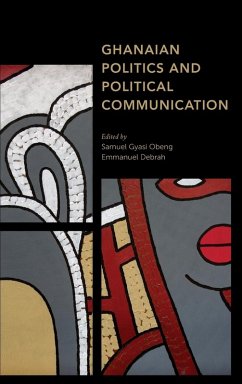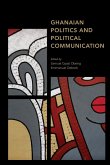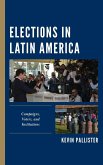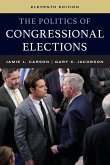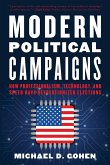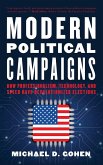Ghanaian Politics and Political Communication
Herausgeber: Obeng, Samuel Gyasi; Debrah, Emmanuel
Ghanaian Politics and Political Communication
Herausgeber: Obeng, Samuel Gyasi; Debrah, Emmanuel
- Gebundenes Buch
- Merkliste
- Auf die Merkliste
- Bewerten Bewerten
- Teilen
- Produkt teilen
- Produkterinnerung
- Produkterinnerung
Provides an understanding of the importance of elections in democratization and the constitution of order.
Andere Kunden interessierten sich auch für
![Ghanaian Politics and Political Communication Ghanaian Politics and Political Communication]() Ghanaian Politics and Political Communication52,99 €
Ghanaian Politics and Political Communication52,99 €![Elections in Latin America Elections in Latin America]() Kevin PallisterElections in Latin America102,99 €
Kevin PallisterElections in Latin America102,99 €![The Politics of Congressional Elections The Politics of Congressional Elections]() Jamie L. CarsonThe Politics of Congressional Elections69,99 €
Jamie L. CarsonThe Politics of Congressional Elections69,99 €![Elections in Latin America Elections in Latin America]() Kevin PallisterElections in Latin America40,99 €
Kevin PallisterElections in Latin America40,99 €![Modern Political Campaigns Modern Political Campaigns]() Michael D. CohenModern Political Campaigns46,99 €
Michael D. CohenModern Political Campaigns46,99 €![Modern Political Campaigns Modern Political Campaigns]() Michael D. CohenModern Political Campaigns101,99 €
Michael D. CohenModern Political Campaigns101,99 €![Political Campaigns in the United States Political Campaigns in the United States]() Richard K. ScherPolitical Campaigns in the United States220,99 €
Richard K. ScherPolitical Campaigns in the United States220,99 €-
-
-
Provides an understanding of the importance of elections in democratization and the constitution of order.
Hinweis: Dieser Artikel kann nur an eine deutsche Lieferadresse ausgeliefert werden.
Hinweis: Dieser Artikel kann nur an eine deutsche Lieferadresse ausgeliefert werden.
Produktdetails
- Produktdetails
- Verlag: Rowman & Littlefield Publishers
- Seitenzahl: 312
- Erscheinungstermin: 23. August 2019
- Englisch
- Abmessung: 235mm x 157mm x 23mm
- Gewicht: 659g
- ISBN-13: 9781786613691
- ISBN-10: 1786613697
- Artikelnr.: 56150821
- Herstellerkennzeichnung
- Libri GmbH
- Europaallee 1
- 36244 Bad Hersfeld
- gpsr@libri.de
- Verlag: Rowman & Littlefield Publishers
- Seitenzahl: 312
- Erscheinungstermin: 23. August 2019
- Englisch
- Abmessung: 235mm x 157mm x 23mm
- Gewicht: 659g
- ISBN-13: 9781786613691
- ISBN-10: 1786613697
- Artikelnr.: 56150821
- Herstellerkennzeichnung
- Libri GmbH
- Europaallee 1
- 36244 Bad Hersfeld
- gpsr@libri.de
Samuel Gyasi Obeng is Professor of Linguistics at Indiana University-Bloomington (USA). He is also an affiliated faculty in the School of Global and International Studies and a faculty of Indiana University's Honors Program. Emmanuel Debrah is Associate Professor in the Department of Political Science and Director of the Legon Center for International Affairs and Diplomacy at the University of Ghana. He specializes in electoral and party politics, local government and decentralization, public policy, and democratic governance.
Prologue Preface and Acknowledgments Dedication Chapter 1. Introduction
Samuel Gyasi Obeng and Emmanuel Debrah PART ONE: GHANAIAN POLITICS Chapter
2. Ghana's Political Environment and the 2016 General Election Emmanuel
Debrah, University of Ghana Chapter 3. Election Campaign in Ghana's 2016
National Elections Seidu Alidu, University of Ghana Chapter 4.
Communicating with the Electorate in the 2016 Elections: Did the Political
Parties and their Candidates Lean on the Issues? Richard Asante, University
of Ghana Chapter 5.(Mis)Coordination: Why Would Ghanaian Political Actors
and Political Parties Encourage Split-Ticket Voting? Samuel Darkwa,
University of West Virginia Chapter 6. Are Members of Parliament in Ghana
Responsive to their Constituents in Policy Making? Evidence from the
National Health Insurance Scheme Hassan Wahab, University of Ghana PART
TWO: GHANAIAN POLITICAL COMMUNICATION Chapter 7. When Government Is Unaware
It Is Incommunicado Margaret I. Amoakohene and Kwasi Ansu-Kyeremeh,
University of Ghana Chapter 8. Pragmatic Analysis of First Person Pronoun
Deixes in President Nana Akuffo Addo's 2018 State of the Nation's Address
(SONA) Kofi Agyekum, University of Ghana Chapter 9. Discursive Construction
of the Representative Claim in UK and Ghanaian Parliamentary Discourse
Kwabena Sarfo Sarfo-Kantankah, University of Cape Coast Chapter 10. How
Much Communication is in Ghanaian Presidents' State of the Nation
Addresses? Margaret I. Amoakohene, University of Ghana Chapter 11. Power,
Domination and Manipulation in Students' Parliamentary Discourse in
Ghanaian University Dora F. Edu-Buandoh and Nancy Boahemaa Nkansah,
University of Cape Coast Chapter 12. The Role of Music in Ghanaian
Political Communication Kofi Agyekum, Joshua Alfred Amuah and Hilarius
Mawutor Wuaku, University of Ghana Chapter 13. President Akufo-Addo's
Address to the Nation on the US-Ghana Military Co-operation Agreement: A
Political Communicative Functional and Framing Analytic Approach Etse
Sikanku, Frank Kofi Boadi, Halisa Aziz and Nana Kwame Osei Fordjour,
University of Ghana Chapter 14. Language and Liberty in the Ghanaian
Political Ecology: A Brief Overview Samuel Obeng, Indiana University
Epilogue Author Information
Samuel Gyasi Obeng and Emmanuel Debrah PART ONE: GHANAIAN POLITICS Chapter
2. Ghana's Political Environment and the 2016 General Election Emmanuel
Debrah, University of Ghana Chapter 3. Election Campaign in Ghana's 2016
National Elections Seidu Alidu, University of Ghana Chapter 4.
Communicating with the Electorate in the 2016 Elections: Did the Political
Parties and their Candidates Lean on the Issues? Richard Asante, University
of Ghana Chapter 5.(Mis)Coordination: Why Would Ghanaian Political Actors
and Political Parties Encourage Split-Ticket Voting? Samuel Darkwa,
University of West Virginia Chapter 6. Are Members of Parliament in Ghana
Responsive to their Constituents in Policy Making? Evidence from the
National Health Insurance Scheme Hassan Wahab, University of Ghana PART
TWO: GHANAIAN POLITICAL COMMUNICATION Chapter 7. When Government Is Unaware
It Is Incommunicado Margaret I. Amoakohene and Kwasi Ansu-Kyeremeh,
University of Ghana Chapter 8. Pragmatic Analysis of First Person Pronoun
Deixes in President Nana Akuffo Addo's 2018 State of the Nation's Address
(SONA) Kofi Agyekum, University of Ghana Chapter 9. Discursive Construction
of the Representative Claim in UK and Ghanaian Parliamentary Discourse
Kwabena Sarfo Sarfo-Kantankah, University of Cape Coast Chapter 10. How
Much Communication is in Ghanaian Presidents' State of the Nation
Addresses? Margaret I. Amoakohene, University of Ghana Chapter 11. Power,
Domination and Manipulation in Students' Parliamentary Discourse in
Ghanaian University Dora F. Edu-Buandoh and Nancy Boahemaa Nkansah,
University of Cape Coast Chapter 12. The Role of Music in Ghanaian
Political Communication Kofi Agyekum, Joshua Alfred Amuah and Hilarius
Mawutor Wuaku, University of Ghana Chapter 13. President Akufo-Addo's
Address to the Nation on the US-Ghana Military Co-operation Agreement: A
Political Communicative Functional and Framing Analytic Approach Etse
Sikanku, Frank Kofi Boadi, Halisa Aziz and Nana Kwame Osei Fordjour,
University of Ghana Chapter 14. Language and Liberty in the Ghanaian
Political Ecology: A Brief Overview Samuel Obeng, Indiana University
Epilogue Author Information
Prologue Preface and Acknowledgments Dedication Chapter 1. Introduction
Samuel Gyasi Obeng and Emmanuel Debrah PART ONE: GHANAIAN POLITICS Chapter
2. Ghana's Political Environment and the 2016 General Election Emmanuel
Debrah, University of Ghana Chapter 3. Election Campaign in Ghana's 2016
National Elections Seidu Alidu, University of Ghana Chapter 4.
Communicating with the Electorate in the 2016 Elections: Did the Political
Parties and their Candidates Lean on the Issues? Richard Asante, University
of Ghana Chapter 5.(Mis)Coordination: Why Would Ghanaian Political Actors
and Political Parties Encourage Split-Ticket Voting? Samuel Darkwa,
University of West Virginia Chapter 6. Are Members of Parliament in Ghana
Responsive to their Constituents in Policy Making? Evidence from the
National Health Insurance Scheme Hassan Wahab, University of Ghana PART
TWO: GHANAIAN POLITICAL COMMUNICATION Chapter 7. When Government Is Unaware
It Is Incommunicado Margaret I. Amoakohene and Kwasi Ansu-Kyeremeh,
University of Ghana Chapter 8. Pragmatic Analysis of First Person Pronoun
Deixes in President Nana Akuffo Addo's 2018 State of the Nation's Address
(SONA) Kofi Agyekum, University of Ghana Chapter 9. Discursive Construction
of the Representative Claim in UK and Ghanaian Parliamentary Discourse
Kwabena Sarfo Sarfo-Kantankah, University of Cape Coast Chapter 10. How
Much Communication is in Ghanaian Presidents' State of the Nation
Addresses? Margaret I. Amoakohene, University of Ghana Chapter 11. Power,
Domination and Manipulation in Students' Parliamentary Discourse in
Ghanaian University Dora F. Edu-Buandoh and Nancy Boahemaa Nkansah,
University of Cape Coast Chapter 12. The Role of Music in Ghanaian
Political Communication Kofi Agyekum, Joshua Alfred Amuah and Hilarius
Mawutor Wuaku, University of Ghana Chapter 13. President Akufo-Addo's
Address to the Nation on the US-Ghana Military Co-operation Agreement: A
Political Communicative Functional and Framing Analytic Approach Etse
Sikanku, Frank Kofi Boadi, Halisa Aziz and Nana Kwame Osei Fordjour,
University of Ghana Chapter 14. Language and Liberty in the Ghanaian
Political Ecology: A Brief Overview Samuel Obeng, Indiana University
Epilogue Author Information
Samuel Gyasi Obeng and Emmanuel Debrah PART ONE: GHANAIAN POLITICS Chapter
2. Ghana's Political Environment and the 2016 General Election Emmanuel
Debrah, University of Ghana Chapter 3. Election Campaign in Ghana's 2016
National Elections Seidu Alidu, University of Ghana Chapter 4.
Communicating with the Electorate in the 2016 Elections: Did the Political
Parties and their Candidates Lean on the Issues? Richard Asante, University
of Ghana Chapter 5.(Mis)Coordination: Why Would Ghanaian Political Actors
and Political Parties Encourage Split-Ticket Voting? Samuel Darkwa,
University of West Virginia Chapter 6. Are Members of Parliament in Ghana
Responsive to their Constituents in Policy Making? Evidence from the
National Health Insurance Scheme Hassan Wahab, University of Ghana PART
TWO: GHANAIAN POLITICAL COMMUNICATION Chapter 7. When Government Is Unaware
It Is Incommunicado Margaret I. Amoakohene and Kwasi Ansu-Kyeremeh,
University of Ghana Chapter 8. Pragmatic Analysis of First Person Pronoun
Deixes in President Nana Akuffo Addo's 2018 State of the Nation's Address
(SONA) Kofi Agyekum, University of Ghana Chapter 9. Discursive Construction
of the Representative Claim in UK and Ghanaian Parliamentary Discourse
Kwabena Sarfo Sarfo-Kantankah, University of Cape Coast Chapter 10. How
Much Communication is in Ghanaian Presidents' State of the Nation
Addresses? Margaret I. Amoakohene, University of Ghana Chapter 11. Power,
Domination and Manipulation in Students' Parliamentary Discourse in
Ghanaian University Dora F. Edu-Buandoh and Nancy Boahemaa Nkansah,
University of Cape Coast Chapter 12. The Role of Music in Ghanaian
Political Communication Kofi Agyekum, Joshua Alfred Amuah and Hilarius
Mawutor Wuaku, University of Ghana Chapter 13. President Akufo-Addo's
Address to the Nation on the US-Ghana Military Co-operation Agreement: A
Political Communicative Functional and Framing Analytic Approach Etse
Sikanku, Frank Kofi Boadi, Halisa Aziz and Nana Kwame Osei Fordjour,
University of Ghana Chapter 14. Language and Liberty in the Ghanaian
Political Ecology: A Brief Overview Samuel Obeng, Indiana University
Epilogue Author Information

